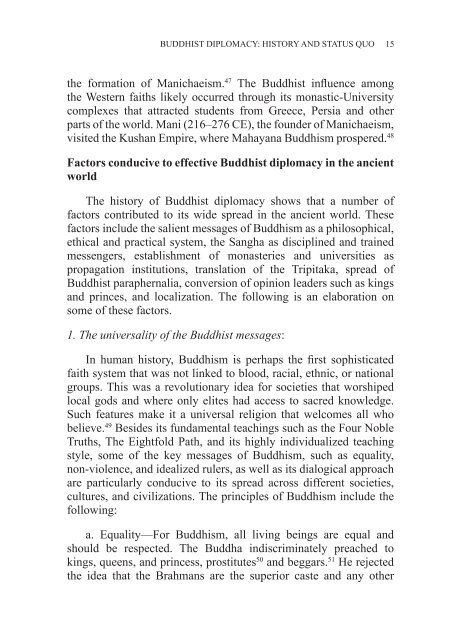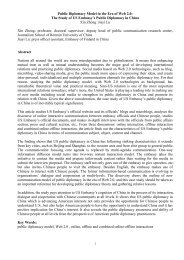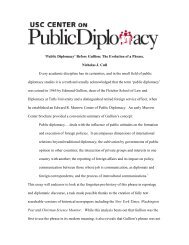Buddhist Diplomacy: History And Status Quo. - USC Center on ...
Buddhist Diplomacy: History And Status Quo. - USC Center on ...
Buddhist Diplomacy: History And Status Quo. - USC Center on ...
- No tags were found...
Create successful ePaper yourself
Turn your PDF publications into a flip-book with our unique Google optimized e-Paper software.
BUDDHIST DIPLOMACY: HISTORY AND STATUS QUO 15the formati<strong>on</strong> of Manichaeism. 47 The <str<strong>on</strong>g>Buddhist</str<strong>on</strong>g> influence am<strong>on</strong>gthe Western faiths likely occurred through its m<strong>on</strong>astic-Universitycomplexes that attracted students from Greece, Persia and otherparts of the world. Mani (216–276 CE), the founder of Manichaeism,visited the Kushan Empire, where Mahayana Buddhism prospered. 48Factors c<strong>on</strong>ducive to effective <str<strong>on</strong>g>Buddhist</str<strong>on</strong>g> diplomacy in the ancientworldThe history of <str<strong>on</strong>g>Buddhist</str<strong>on</strong>g> diplomacy shows that a number offactors c<strong>on</strong>tributed to its wide spread in the ancient world. Thesefactors include the salient messages of Buddhism as a philosophical,ethical and practical system, the Sangha as disciplined and trainedmessengers, establishment of m<strong>on</strong>asteries and universities aspropagati<strong>on</strong> instituti<strong>on</strong>s, translati<strong>on</strong> of the Tripitaka, spread of<str<strong>on</strong>g>Buddhist</str<strong>on</strong>g> paraphernalia, c<strong>on</strong>versi<strong>on</strong> of opini<strong>on</strong> leaders such as kingsand princes, and localizati<strong>on</strong>. The following is an elaborati<strong>on</strong> <strong>on</strong>some of these factors.1. The universality of the <str<strong>on</strong>g>Buddhist</str<strong>on</strong>g> messages:In human history, Buddhism is perhaps the first sophisticatedfaith system that was not linked to blood, racial, ethnic, or nati<strong>on</strong>algroups. This was a revoluti<strong>on</strong>ary idea for societies that worshipedlocal gods and where <strong>on</strong>ly elites had access to sacred knowledge.Such features make it a universal religi<strong>on</strong> that welcomes all whobelieve. 49 Besides its fundamental teachings such as the Four NobleTruths, The Eightfold Path, and its highly individualized teachingstyle, some of the key messages of Buddhism, such as equality,n<strong>on</strong>-violence, and idealized rulers, as well as its dialogical approachare particularly c<strong>on</strong>ducive to its spread across different societies,cultures, and civilizati<strong>on</strong>s. The principles of Buddhism include thefollowing:a. Equality—For Buddhism, all living beings are equal andshould be respected. The Buddha indiscriminately preached tokings, queens, and princess, prostitutes 50 and beggars. 51 He rejectedthe idea that the Brahmans are the superior caste and any other











